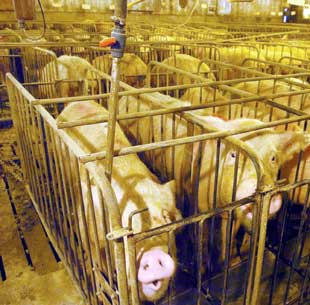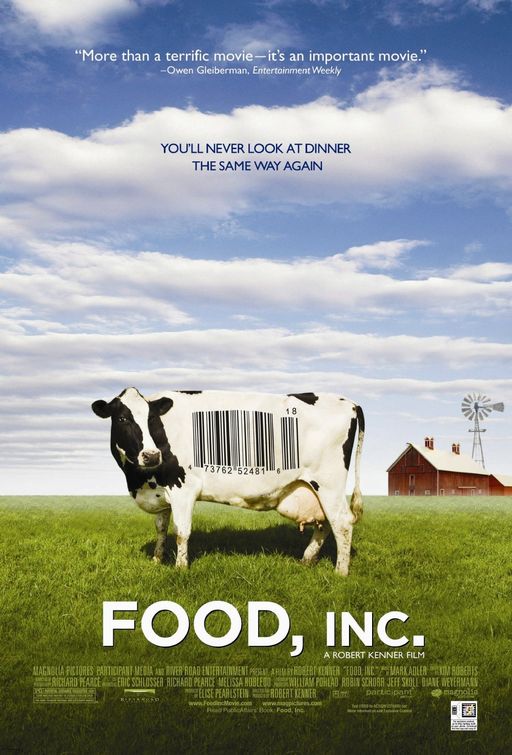Food is pretty awesome; I mean we live off the stuff… literally. We all enjoy sitting down for a nice meal but do we ever think of where this food we’re eating is coming from? The agriculture industry is such an important part of our world but many of us no little to nothing about it, me included. I don’t know where the tomatoes in my salad come from or the pepperoni on my pizza…
  |
http://kenokazaki.com/wp-content/uploads/2010/12/FullPlate-Melih-Kesmen.jpg and http://torontoist.com/attachments/toronto_patrickm/2008_04_07_loblaw.jpg Where does your food come from? Buy your groceries from Loblaw? Is it really great food? |
Ø Industrial agriculture is the modern farming technique that refers to the industrialized production of livestock and crops. The methods used to produce this food include mostly machinery, genetic technology, chemicals, hormones and antibiotics.
Ø Sustainable agriculture is basically the opposite; it is farming while keeping in mind the affects on the health and sustainability of the environment, the economy and us, the ones who eat the food.
  |
http://tasmaniantimes.com/images/uploads/Lukas2_TasDevil_thumb.jpg and http://tiki.oneworld.net/food/sustainable_farming.gif Industrial Farming v.s. Sustainable Farming |
Industrial agriculture provides most of the food in our supermarkets, especially in developed countries. This type of agriculture is much cheaper, much more time efficient in the amount it produces, and at to many, it seems the only way to keep up with the growing demand for food. Documentaries like Food Inc, have exposed the dirty little secrets of this growing industry and it is common knowledge that most, if not all, of our food is now genetically modified somehow. So, then if we know which option is better than why is there such as issue; because by 2050 there is going to be an estimated population of over 9 billion people on this earth and we need to feed all of them (United Nations News Centre). To keep up with this growth in the past, factory farming was invented and now provides 74% of the world’s poultry, 43% of all beef and 68% of all eggs (World Watch Institute). Factory farming is the process of raising livestock in a high density environment, the highest production rate and the lowest costs.


http://transitionculture.org/wp-content/uploads/food_inc.jpg and http://cruelty-free.org/environment/wp-content/uploads/2009/04/factory_farm.jpg
Food Inc was a documentary that “outed” the disgusting food industry in America
These pigs are kept like this 24/7 until they are slaughtered in this factory farm. The ethics of this is a huge part of the growing discomfort with using this method of farming. You can see how animal cruelty can be assumed in most cases and many are fighting the cruelty aspect of the issue. Others are against it because of the health impact to humans; the Centers for Disease Control and Prevention have identified that the use of antibiotics may create antibiotic-resistant pathogens; parasites, bacteria, and viruses may be spread, among many other things. Some are most worried about the terrible environmental impacts of factory farming, environmental degradation, pollution of water, air, soil, and the harmful use of a huge amount of pesticides.
| http://www.treehugger.com/World-Population-Growth-2050.JPG How are we going to feed the world's growing population? |
I commented on the blogs... http://caitlincosgrovebioblog.blogspot.com/ and http://bioblogstuff.blogspot.com/
Works Cited
"2050 High-Level Experts Forum: The Forum." FAO: FAO Home. Web. 15 Jan. 2011. <http://www.fao.org/wsfs/forum2050/wsfs-forum/en/>.
Biello, David. "Another Inconvenient Truth: The World's Growing Population Poses a Malthusian Dilemma: Scientific American." Science News, Articles and Information | Scientific American. Web. 15 Jan. 2011. <http://www.scientificamerican.com/article.cfm?id=growing-population-poses-malthusian-dilemma>.
"Boosting Agricultural Productivity Key to Feeding Growing Population – UN." Welcome to the United Nations: It's Your World. Web. 15 Jan. 2011. <http://www.un.org/apps/news/story.asp?NewsID=32503&Cr=fao&Cr1>.
"Nutrition and the Environment." Welcome to the Official Web Site Locator for the UN System OfOrganizations. Web. 15 Jan. 2011. <http://www.unsystem.org/SCN/archives/scnnews21/ch04.htm#TopOfPage>.
"World Summit on Food Security: World Summit." FAO: FAO Home. Web. 15 Jan. 2011. <http://www.fao.org/wsfs/world-summit/en/>.